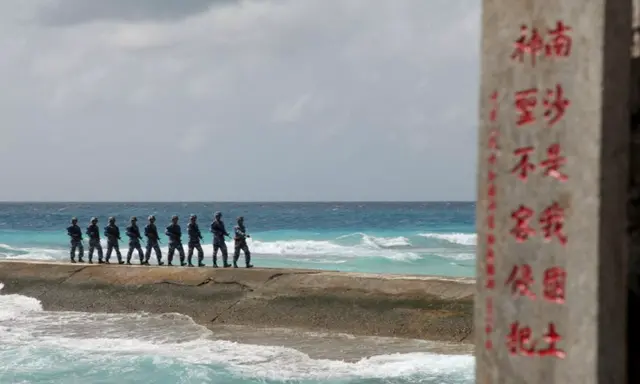Actions by Philippines and others after arbitration ruling to set tone: China Daily
Manila must set aside an expected international tribunal ruling on the South China Sea before stalled talks with Beijing can resume over their long-running maritime disputes, China Daily reported yesterday.
China Daily reported the precondition for resuming the negotiations yesterday, citing anonymous sources.
A formation of the Nanhai Fleet of China's Navy on Saturday finished a three-day patrol of the Nansha islands in the South China Sea. Photo:Xinhua
After the ruling in the South China Sea arbitration case is unveiled next week, China's response will "fully depend" on actions taken by the Philippines and other countries, according to China Daily.
The Arbitral Tribunal in The Hague, established at Manila's unilateral request despite China's objection, will announce its ruling on July 12. Washington, a major ally of Manila, has publicly pressed Beijing to accept the ruling.
Speculation on China's possible reactions to the ruling have been fueled partly by the fact that the case involves sovereignty and maritime delimitation.
"If China then decides to take countermeasures, its counteracting paces and paradigms will fully conform to its own agenda and will not be framed by such actions (by parties including Manila)," one of the sources said.
Another source said "there will be no incident at all if all related parties put aside the arbitration results".
Beijing has not participated in the case, claiming the tribunal has no jurisdiction and insisting that the disputes be solved bilaterally, while more than 130 nations have offered at least partial support to Beijing’s position, according to state media.
The South China Morning Post reported that in a congratulatory message to new Philippine President Rodrigo Duterte, President Xi Jinping said ties between the two countries were at a key point and he was willing to work with Duterte to improve relations. But Duterte has so far sent mixed signals over the maritime disputes, insisting that he will not discuss the case until a ruling is made.
Beijing said previously that the door to bilateral talks was always open even though there have been no negotiations over the maritime disputes for years. In the Hague case, the Philippines is contesting China’s claim to an area shown on its maps as a “nine-dash” line covering hundreds of disputed islands and reefs, according to the SCMP.
Some speculate that the PLA Navy drill in the South China Sea from Tuesday to July 11 is China's warning against the ruling. The Associated Press noted that the designated area for the drills covers China's Xisha Islands, China Daily reported.
In response, China's Ministry of National Defense said on Monday that the drill is "a regular exercise and was arranged in accordance with the annual plan".
There also has been speculation that after the ruling is announced, China will establish an air defense identification zone in the South China Sea or send troops to its Huangyan Island there.
"So far, no Chinese official has made such announcement," one of the sources said, adding that "China has never taken a lead in provoking for an accident or stirring up regional tension".
Meanwhile, the sources referred to major sovereignty-related incidents since 2010, including the Diaoyu Islands crisis prompted by Japan in 2012 and the Huangyan Island standoff brought by the Philippines earlier in the same year.
"But if there are more such provocations, China will not shy away from them," one of the sources said.
(CHINA DAILY/SOUTH CHINA MORNING POST)
 简体中文
简体中文

